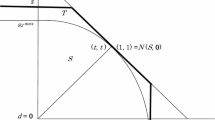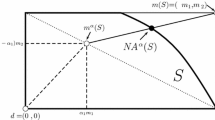Abstract
In multidimensional bargaining situations where individuals possess relevant private information, say about preferences, allocational efficiency is a central concern. Even if there is no squabbling over distribution—for example, if contingent commitments on allocations can be made before private information is secured—honest revelation comes only by sacrificing efficiency. Indeed, the incentive-compatible, second-best outcomes generally require that some allocations be off the contract curve (ex post inefficient). The potential for recontracting, by ruling out such inefficient allocations and the second-best equilibria they support, would hurt matters further.
Similar content being viewed by others
References
D'Aspremont, C. and L.-A., Gerard-Varet. (1979). “Incentives and Incomplete Information”,Journal of Public Economics 11, 25–45.
Chatterjee, K. and W., Samuelson. (1983). “Bargaining under Incomplete Information”,Operations Research 31, 835–851.
Chatterjee, K., J.W., Pratt, and R.J., Zeckhauser. (1978). “Paying the Expected Externality for a Price Quote Achieves Bargaining Efficiency”,Economic Letters 1, 311–313.
Holmstrom, B. (1977). “On Incentives and Control in Organizations”. Ph.D. dissertation, Graduate School of Business, Stanford University.
Myerson, R.B. and M.A., Satterthwaite. (1983). “Efficient Mechanisms for Bilateral Trading”.Journal of Economic Theory 29, 265–281.
Nichols, A.L. and R.J., Zeckhauser. (1982). “Targeting Transfers through Restrictions on Recipients”,American Economic Review 72, 372–377.
Pratt, J.W. and R.J., Zeckhauser. (1987). “Incentive-based Decentralization: Expected-Externality Payments Induce Efficient Behaviour in Groups.” In G.R., Feiwel (ed.),Arrow and the Ascent of Modern Economic Theory. New York: New York University Press, pp. 439–483.
Raiffa, H. (1982).The Art and Science of Negotiation. Cambridge, MA: Harvard University Press.
Rosenthal, R. (1978). “Arbitration of Two-Party Disputes under Uncertainty,”Review of Economic Studies 45, 595–604.
Spence, M. (1973). “Job Market Signaling,”Quarterly Journal of Economics 87, 355–374.
Author information
Authors and Affiliations
Additional information
Support was received from the Decision, Risk and Management Science Program of the National Science Foundation. Rachel Algaze Croson provided able assistance; referees provided helpful comments.
Rights and permissions
About this article
Cite this article
Pratt, J.W., Zeckhauser, R. Multidimensional bargains and the desirability of ex post inefficiency. J Risk Uncertainty 5, 205–216 (1992). https://doi.org/10.1007/BF00057878
Issue Date:
DOI: https://doi.org/10.1007/BF00057878




